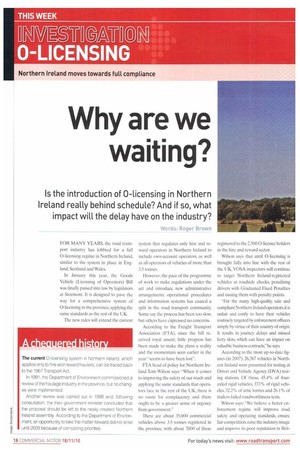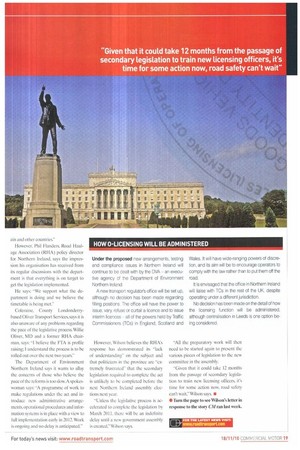Why are we waiting?
Page 18

Page 19

If you've noticed an error in this article please click here to report it so we can fix it.
Is the introduction of 0-licensing in Northern Ireland really behind schedule? And if so, what impact will the delay have on the industry?
Words: Roger Brown
FOR MANY YEARS, the road transport industry has lobbied for a full 0-licensing regime in Northern Ireland, similar to the system in place in England, Scotland and Wales.
In January this year, the Goods Vehicle (Licensing of Operators) Bill was finally passed into law by legislators at Stormont. It is designed to pave the way for a comprehensive system of 0-licensing in the province, applying the same standards as the rest of the UK.
The new rules will extend the current
system that regulates only hire and reward operators in Northern Ireland to include own-account operators, as well as all operators of vehicles of more than 3.5 tonnes.
However, the pace of the programme of work to make regulations under the act and introduce new administrative arrangements, operational procedures and information systems has caused a split in the road transport community. Some say the process has been too slow, but others have expressed no concerns.
According to the Freight Transport Association (FTA). since the bill received royal assent, little progress has been made to make the plans a reality and the momentum seen earlier in the year "seems to have been lost".
ETA head of policy for Northern Ireland Tom Wilson says: "When it comes to improving the safety of our roads and applying the same standards that operators face in the rest of the UK, there is no room for complacency and there ought to be a greater sense of urgency from government."
There are about 35,000 commercial vehicles above 3.5 tonnes registered in the province, with about 7,000 of these registered to the 2,500 0-licence holders in the hire and reward sector.
Wilson says that until 0-licensing is brought fully into line with the rest of the UK, VOSA inspectors will continue to target Northern Ireland-registered vehicles at roadside checks, penalising drivers with Graduated Fixed Penalties and issuing them with penalty points.
"For the many high-quality, safe and compliant Northern Ireland operators, it is unfair and costly to have their vehicles routinely targeted by enforcement officers simply by virtue of their country of origin. It results in journey delays and missed ferry slots, which can have an impact on valuable business contracts," he says.
According to the most up-to-date figures (in 2007), 26,267 vehicles in Northern Ireland were presented for testing at Driver and Vehicle Agency (DVA) testing stations. Of these, 45.4% of fouraxled rigid vehicles, 37,3% of rigid vehicles, 32.2% of attic lorries and 26.1% of trailers failed roadworthiness tests.
Wilson says: -We believe a better enforcement regime will improve road safety and operating standards, ensure fair competition. raise the industry image and improve its poor reputation in Brit
am n and other countries" However. Phil Flanders, Road Haulage Association (RHA) policy director for Northern Ireland, says the impression his organisation has received from its regular discussions with the department is that everything is on target to get the legislation implemented.
He says: "We support what the department is doing and we believe the timetable is being met."
Coleraine, County Londonderrybased Oliver Transport Services, says it is also unaware of any problems regarding the pace of the legislative process. Willie Oliver, MD and a former RHA chairman, says: '1 believe the FTA is profile raising; I understand the process is to be rolled out over the next two years."
The Department of Environment Northern Ireland says it wants to allay the concerns of those who believe the pace of the reforms is too slow. A spokeswoman says: "A programme of work to make regulations under the act and introduce new administrative arrangements, operational procedures and information systems is in place with a view to full implementation early in 2012 Work is ongoing and no delay is anticipated."
However, Wilson believes the RHAs response has demonstrated its "lack of understanding," on the subject and that politicians in the province are "extremely frustrated.' that the secondary legislation required to complete the act is unlikely to be completed before the next Northern Ireland assembly elections next year,
"Unless the legislative process is accelerated to complete the legislation by March 2011, there will be an indefinite delay until a new government assembly is created," Wilson says. "Al] the preparatory work will then need to be started again to present the various pieces of legislation to the new committee in the assembly.
"Given that it could take 12 months from the passage of secondary legislation to train new licensing officers, it's time for some action now, road safety can't wait," Wilson says. •
0 Turn the page to see Wilson's letter in response to the story CM ran last week.




































































































































